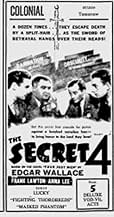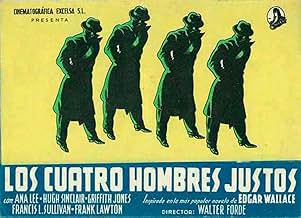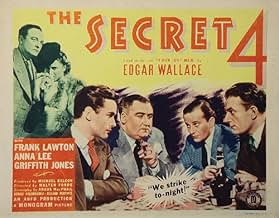IMDb RATING
6.3/10
199
YOUR RATING
The four men of the title are British WWI veterans who decide to work secretly against enemies of the country. They aren't above a bit of murder or sabotage to serve their ends, but they con... Read allThe four men of the title are British WWI veterans who decide to work secretly against enemies of the country. They aren't above a bit of murder or sabotage to serve their ends, but they consider themselves to be true patriots.The four men of the title are British WWI veterans who decide to work secretly against enemies of the country. They aren't above a bit of murder or sabotage to serve their ends, but they consider themselves to be true patriots.
Featured reviews
Four men - Hugh Sinclair, Griffith Jones, Francis L. Sullivan and Frank Lawton - begin a program of sabotage and assassination around London. Newspaperwoman Anna Lee is on their trail. What do these four very English gentlemen hope to accomplish? Are they spies for a foreign government? Or are they patriots, hoping to cleanse Britain of traitors before the inevitable war?
Walter Forde's bizarre and violent movie is derived from a Edgar Wallace story. Although it looks like a shocker, there were lots of movies in the era that supported the idea of vigilante justice. In the US, the Production Code ended most of those- with the occasional exception of a Gower Gulch producer urging people to rise up and shoot down gangsters. You would think that Britain, with its own censorship,would not permit the production of a movie like this, but the writing was on the wall, and people clearly saw World War Two coming. Even so, it was a near thing. Although there were showings of this in London in June, it didn't go into general release until November, and didn't show in the US until April of 1940, with an epilogue showing goose-stepping Nazi troops and,an appeal to US involvement.
There's an air of constant frustration rather than suspense about the movie, with the four men uncertain of their faltering plans, and Anna Lee's baffled investigation contributing. I think it was a deliberate choice by the film makers, but it makes it more difficult to watch the film.
Walter Forde's bizarre and violent movie is derived from a Edgar Wallace story. Although it looks like a shocker, there were lots of movies in the era that supported the idea of vigilante justice. In the US, the Production Code ended most of those- with the occasional exception of a Gower Gulch producer urging people to rise up and shoot down gangsters. You would think that Britain, with its own censorship,would not permit the production of a movie like this, but the writing was on the wall, and people clearly saw World War Two coming. Even so, it was a near thing. Although there were showings of this in London in June, it didn't go into general release until November, and didn't show in the US until April of 1940, with an epilogue showing goose-stepping Nazi troops and,an appeal to US involvement.
There's an air of constant frustration rather than suspense about the movie, with the four men uncertain of their faltering plans, and Anna Lee's baffled investigation contributing. I think it was a deliberate choice by the film makers, but it makes it more difficult to watch the film.
I don't tend to spend time having a go at other reviewers on this site as we are all entitled to our opinions.however how on earth can you post a review on a film when you have never seen it.Also to say that Edgar Wallace is forgotten is to say the least controversial,given his contribution ,if any,to King Kong.The thing about Wallace is that he knew when he was on to a good thing.Unknown masterminds.killing.robbing,a law unto themselves.The Frog,The squeaker etc.If a formula works then just use it again.Here Michael Balcon reuses it just as the country is on the verge of war.At the beginning of the film,the identity of the captors is not revealed.however the film ends with a climactic speech aimed fairly and squarly at Hitler.. So this film starts out as a political thriller and ends up as a morale boosting flag waver.
I really enjoyed this film, it took me back to another era.... during the first part of the film I found myself hoping that the 'nosey journalist' wouldn't spoil the action by becoming a romantic lead with one of the four..... just in the same way I used to as a youngster. When you knew that the romance was going to spoil the adventure. But to be fair, I don't think there any many films of this time that don't. But I think my point is that this film took me back to the 'adventure fantasy' every young child feels watching this type of film, where a female romantic character only slows down or stops the adventure or even worse causes the good guys plans to fail because of that romantic lead.
It was all great fun and humorous, a typical adventure film of the time and a rousing of patriotism, I assume for the trouble that would shortly arrive to everyone in England and so there are some touches of propaganda in a subtle way but not overtly so. Indeed, watching any films of this era even well before the war were what some would call propaganda but was more jingoistic, which most of these films of that day were.
Of course, to compare it to anything to come later is missing the point of the film, that is to entertain and I'm sure the film did just that for many people at the time and it did for me! It's a great school boy adventure romp even now, just remember to really get the enjoyment from this film just switch off and layback. It's a great way to spend 90 minutes of your time especially if you enjoy these old British films, as I do. I would also be careful of the copy you choose to watch as I have seen a few very poor quality copies, when first looking for this film but was fortunate to find a good quality and unedited, from the original version, copy. Overall great fun in the spirit of Bulldog Drummond or The Saint, which were all popular films of the time. I am sure anyone reading here will enjoy this film.
It was all great fun and humorous, a typical adventure film of the time and a rousing of patriotism, I assume for the trouble that would shortly arrive to everyone in England and so there are some touches of propaganda in a subtle way but not overtly so. Indeed, watching any films of this era even well before the war were what some would call propaganda but was more jingoistic, which most of these films of that day were.
Of course, to compare it to anything to come later is missing the point of the film, that is to entertain and I'm sure the film did just that for many people at the time and it did for me! It's a great school boy adventure romp even now, just remember to really get the enjoyment from this film just switch off and layback. It's a great way to spend 90 minutes of your time especially if you enjoy these old British films, as I do. I would also be careful of the copy you choose to watch as I have seen a few very poor quality copies, when first looking for this film but was fortunate to find a good quality and unedited, from the original version, copy. Overall great fun in the spirit of Bulldog Drummond or The Saint, which were all popular films of the time. I am sure anyone reading here will enjoy this film.
In his 1940 review of this film for the New York Times, critic B. R. Crisler unenthusiastically described the 1939 film adaptation of Edgar Wallace's 1905 novel THE FOUR JUST MEN as being both "infected with the virus propagandistus" and as an "espionage melodrama". Considering the tone and subject of the film and the popular sentiment in the United States at the time, this description is hardly surprising. In the summer of 1939, the growing threat of Nazi Germany was clear to all in Europe who wished to see it. Hitler had already conquered Austria and Czechoslovakia and the invasion of Poland, the beginning of World War II, was only months away. In such dark times the motivation behind a film about four men, dedicated to the cause of justice and determined to prevent Great Britain from allowing itself to fall to the Nazi war machine is wholly understandable.
The four just men of the title are vigilantes, acting outside the law, their identities secret, who have devoted themselves, for reasons never revealed in the film, to fighting crime, tyranny and injustice wherever they find it – mostly in Europe and America apparently. The group is comprised of actor extraordinaire Humphrey Mansfield (Hugh Sinclair), playwright James Brodie (Griffith Jones), Léon Poiccard (Francis L. Sullivan) the successful owner of a exclusive fashion house and foreign correspondent James Terry (Frank Lawton). In the opening sequence, Terry is rescued by his comrades from a Prussian prison where he is moments away from being executed as a spy. Terry escapes with information that a highly placed fifth columnist inside the British government is laying the groundwork for some kind of attack against the United Kingdom. The murder of Myra Hastings (Lydia Sherwood), the wife of a Foreign Office official, leads the Just Men to discover that the Nazi agent is the popular MP Sir Hamar Ryman (Alan Napier) and that the endgame of the enemy plot is nothing less than the invasion and conquest of Great Britain. With only days left until the plan reaches fruition, the race is on to bring down Ryman and save the empire.
The glaring political elements aside, the film plays out like a standard B movie adventure romp. Hugh Sinclair demonstrates he is every bit the actor Mansfield is supposed to be, slipping in and out of characters and disguises with a skill that would leave even Rollin Hand envious. Sullivan is both charming and forceful as the leader of the group and Jones is likable enough as the film's romantic lead, trying to keep eager girl reporter Ann Lodge (Anna Lee) off the track as she edges closer and closer to the truth behind the death of Myra Hastings and the hidden identities of the Four Just Men. Only Lawton is underutilized, his character spending much of the film abroad, and therefore off screen, digging up vital details about the enemy plot.
The film is so obviously an unsubtle warning about the dangers of Nazi appeasement that it cannot escape being labeled as a propaganda film. While the message it champions seems unsurprising today, one must remember that it had only been less than a year since Chamberlain's "peace in our time" speech and that in the United States rules were firmly in place to prevent criticism of Hitler's Germany in Hollywood produced films. But on December 7, 1941 all that would change and Hollywood itself would soon after become the greatest producer of anti Nazi propaganda in the world. Deeming THE FOUR JUST MEN as being "espionage melodrama" is also not inaccurate. But in this too was the film ahead of its time. With the arrival of the Cold War in the 1950s the "espionage melodrama" would come into its own, eventually leading to James Bond and the spy craze of the 1960's.
Never having been released on video or DVD the film is a difficult one to see, but certainly worth the effort if the opportunity arises. It is neither great art, nor great cinema, but it is an entertaining adventure yarn, and a lasting note of a precarious era in modern history.
The four just men of the title are vigilantes, acting outside the law, their identities secret, who have devoted themselves, for reasons never revealed in the film, to fighting crime, tyranny and injustice wherever they find it – mostly in Europe and America apparently. The group is comprised of actor extraordinaire Humphrey Mansfield (Hugh Sinclair), playwright James Brodie (Griffith Jones), Léon Poiccard (Francis L. Sullivan) the successful owner of a exclusive fashion house and foreign correspondent James Terry (Frank Lawton). In the opening sequence, Terry is rescued by his comrades from a Prussian prison where he is moments away from being executed as a spy. Terry escapes with information that a highly placed fifth columnist inside the British government is laying the groundwork for some kind of attack against the United Kingdom. The murder of Myra Hastings (Lydia Sherwood), the wife of a Foreign Office official, leads the Just Men to discover that the Nazi agent is the popular MP Sir Hamar Ryman (Alan Napier) and that the endgame of the enemy plot is nothing less than the invasion and conquest of Great Britain. With only days left until the plan reaches fruition, the race is on to bring down Ryman and save the empire.
The glaring political elements aside, the film plays out like a standard B movie adventure romp. Hugh Sinclair demonstrates he is every bit the actor Mansfield is supposed to be, slipping in and out of characters and disguises with a skill that would leave even Rollin Hand envious. Sullivan is both charming and forceful as the leader of the group and Jones is likable enough as the film's romantic lead, trying to keep eager girl reporter Ann Lodge (Anna Lee) off the track as she edges closer and closer to the truth behind the death of Myra Hastings and the hidden identities of the Four Just Men. Only Lawton is underutilized, his character spending much of the film abroad, and therefore off screen, digging up vital details about the enemy plot.
The film is so obviously an unsubtle warning about the dangers of Nazi appeasement that it cannot escape being labeled as a propaganda film. While the message it champions seems unsurprising today, one must remember that it had only been less than a year since Chamberlain's "peace in our time" speech and that in the United States rules were firmly in place to prevent criticism of Hitler's Germany in Hollywood produced films. But on December 7, 1941 all that would change and Hollywood itself would soon after become the greatest producer of anti Nazi propaganda in the world. Deeming THE FOUR JUST MEN as being "espionage melodrama" is also not inaccurate. But in this too was the film ahead of its time. With the arrival of the Cold War in the 1950s the "espionage melodrama" would come into its own, eventually leading to James Bond and the spy craze of the 1960's.
Never having been released on video or DVD the film is a difficult one to see, but certainly worth the effort if the opportunity arises. It is neither great art, nor great cinema, but it is an entertaining adventure yarn, and a lasting note of a precarious era in modern history.
Edgar Wallace's thrillers usually tended to be tricky with a lot of confusing details, the intrigues were generally overburdened with both active people and amassed complications, and this is no exception, but it is as well written and contrived as any thriller by Hitchcock, as "The Foreign Correspondent" is bound to enter the mind. This is a pre-war thriller, but the war is more than impending, and the author impressingly anticipates the dangers ahead. Nothing is mentioned about Germany, not even the beginning of the film in a foreign prison reveals anything of any foreign nation, but instead the thriller is altogether thoroughly British and couldn't be more so. Edgar Wallace was a Fleet Street man, and there is a lot of journalism here, and every time he includes his expertise in that field, the matter beomes interesting and successful. All the actors here are forgotten today, except possibly Francis L. Sullivan, well known from many later classics, but they all act well enough and especially Anna Lee as the journalist getting mixed up in the intriguing mess but actually helping it to get through in the end. It is great entertainment, great action, constantly on a tremendous move, and the suspense of the intrigue prevents it from becoming disturbing for its superficiality, which usually is a trait in Edgar Wallace's more than prolific output. So it is a fascinating study in the awareness in certain circles of what was ahead in the immediate coming decade.
Did you know
- TriviaThe film was released only a few weeks before the start of the Second World War. It has been widely perceived that the villainous politician in the story, whom the Four Just Men have targeted, is an archetypal appeaser type, sympathetic to the Nazis and in a war, likely to prove a traitor to Britain. When the film was re-released in 1944, an extended ending was added, featuring overt propaganda elements, including footage of RAF fighters.
- Quotes
James Terry: You can't mistake death when you've cheated him for half a year.
- Crazy creditsOpening credits prologue: Regensberg 1938
Details
- Release date
- Country of origin
- Languages
- Also known as
- The Secret Four
- Filming locations
- Ealing Studios, Ealing, London, England, UK(studio: made at)
- Production companies
- See more company credits at IMDbPro
- Runtime1 hour 25 minutes
- Color
- Aspect ratio
- 1.37 : 1
Contribute to this page
Suggest an edit or add missing content

Top Gap
By what name was Les quatre justiciers (1939) officially released in Canada in English?
Answer






























